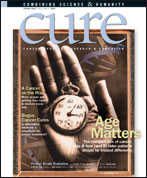Publication
Article
CURE
Heart Health for Childhood Cancer Patients
Author(s):
Statistics on the long-term heart effects of therapy include risk factors that increase the likelihood of heart damage in a childhood cancer survivor.
With certain therapies, the risk of heart damage increases throughout a cancer survivor’s lifetime, which is why childhood cancer survivors often experience more treatment-related effects to the heart than adult survivors. More than 75 percent of children now survive cancer, and the long-term effects of treatment on this population are gaining attention.
Children’s hearts are particularly susceptible to certain types of chemotherapy, especially anthracyclines, such as Adriamycin. These drugs have been used to treat childhood cancer for more than 30 years, and although they have shown great success in treating some cancers, such as acute leukemia, they can also damage the heart. More importantly, the damage may get worse over time, according to a 2006 study in the Annals of Oncology that found heart problems can appear years and even decades after treatment with anthracyclines.
Radiation to the chest can also harm young hearts, depending on the dose used and the amount of heart tissue exposed to radiation. Radiation may damage the heart muscle, valves or pericardium, though newer radiation methods to limit exposure have reduced these risks.
Risk factors that increase the likelihood of heart damage in a childhood cancer survivor include:
- Age. The younger the child at the time of treatment, the greater the risk for heart problems.
- Sex. Girls are more susceptible to heart damage than boys.
- Family history of heart disease.
- Other risk factors. As young patients age, other risk factors for heart disease—such as high blood pressure, high cholesterol, obesity, smoking or diabetes—may increase the risk of treatment-related heart problems.
- Pregnancy in adulthood. Women who survive childhood cancer may be at risk for heart problems during pregnancy because increased blood volume, heart rate and blood pressure put extra strain on the heart.
- Excessive exercise. Some forms of exercise, such as weight-lifting, can put excessive strain on the heart. Adult cancer survivors should discuss any exercise plans with their physician.
Long-term data from the Childhood Cancer Survivor Study found that while less than 2 percent of children treated for cancer will develop severe heart problems, there is currently no way to predict who will be affected. However, researchers are making progress in identifying specific gene variations that put a child at higher risk for heart damage.
It’s important for childhood cancer survivors to get regular checkups throughout their lifetime to monitor heart health. Patients (or their parents) should also keep a summary of diagnosis and treatment, including drugs taken and test results.





